|
|
|
Sort Order |
|
|
|
Items / Page
|
|
|
|
|
|
|
| Srl | Item |
| 1 |
ID:
086718
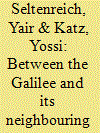

|
|
|
|
|
| Publication |
2009.
|
| Summary/Abstract |
The Jewish Colonization Association organized Jewish rural settlements at the beginning of the twentieth century all over the world. Its colonization effort in Cyprus, although minor and doomed is nevertheless important, as it is widely documented and thus helps to understand essential dynamics and conceptions of the JCA administration.
The present article is based on a report prepared by Jules Rosenheck, a high official of JCA in nearby Palestine, where the JCA's activity was much more intensive. Rosenheck's report reviews a wide scope of local characteristics, from agricultural techniques to medical conditions. On the human scale, it gives a thorough introspection of pettiness and generosity, thriftiness as well as laziness and carelessness. Moreover, the report exposes in detail the inner logic of the JCA, and through it of philanthropie associations in general at that period, about management, technical and agricultural as well as personal. It also contributes to a better understanding of the JCA's conceptions concerning its Palestinian settlements, as Rosenheck refers to them constantly.
|
|
|
|
|
|
|
|
|
|
|
|
|
|
|
|
| 2 |
ID:
086719
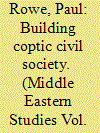

|
|
|
|
|
| Publication |
2009.
|
| Summary/Abstract |
Mubarak's Egypt is a relatively liberal regime which nonetheless retains relatively tight controls on civil society activity so as to pre-empt political activism, particularly that arising from Islamist or secular rivals to the regime. In spite of the constraints of Egyptian politics and their subordinate status as dhimmis under Islam, Copts have managed to create a wide edifice of civil society in Mubarak's Egypt. The explanations for this reside the internal strength and vibrancy of Coptic institutions themselves and in the non-threatening and moderating influence displayed by Coptic civil society.
|
|
|
|
|
|
|
|
|
|
|
|
|
|
|
|
| 3 |
ID:
086707
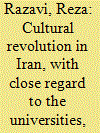

|
|
|
|
|
| Publication |
2009.
|
| Summary/Abstract |
The cultural revolution (1980-83), has been regarded by the elite in Iran as one major step towards the establishment of Islamic values in the universities. Twenty-eight years after those events, the elite in Iran are still struggling to implement their policies effectively in universities. The sudden rise in the political activities of the student movement during Mohammad Khatami's presidency (1997-2005) was in many ways a disappointing development for those who had initiated the cultural revolution. There was a general feeling that under the new president, Mahmoud Ahmadinezhad (2005-present), the student movement activities would decline. However, this has not been the case. The new upsurge in the activities of the student movement in Iran has raised a significant question: why has there been a revival in these activities under a more conservative social and political order? This article attempts to examine this central issue by re-examining the events that contributed to the rise and resistance to the cultural revolution. This article will also discuss contemporary materials and will highlight a number of different issues which will shed new light on the understanding of this topical subject.
|
|
|
|
|
|
|
|
|
|
|
|
|
|
|
|
| 4 |
ID:
086720
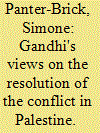

|
|
|
|
|
| Publication |
2009.
|
| Summary/Abstract |
This historical analysis of Mahatma Gandhi's views on the Jewish-Arab conflict in Palestine at the time of the British Mandate distinguishes four phases. The initial involvement is Gandhi's intervention in support of the Caliph's temporal rule in Palestine. The second deals with a secret offer of mediation addressed to the Jewish Agency in Jerusalem. The third is his highly controversial letter to 'The Jews'. In the last phase, Gandhi chose to remain silent, but is alleged to have stated that the Jews had a good case and a prior claim, a statement that seems at variance with previous attitudes. The question is raised as to how far Gandhi's views were consistent. They are explained by the evolving political context in India, as well as in Palestine, the two being intertwined in an ever tightening knot. Gandhi's commitments are revisited and clarified in the light of new research.
|
|
|
|
|
|
|
|
|
|
|
|
|
|
|
|
| 5 |
ID:
086709
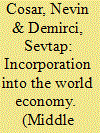

|
|
|
|
|
| Publication |
2009.
|
| Summary/Abstract |
The impact of globalization on the Ottoman Empire and modern Turkey was first observed broadly in the railways of the transportation sector in the 1850s, and eventually shifted towards highways by the 1950s. This change profoundly affected the structure of the economy, ultimately leading to its integration into the global system. In this article, we look at three questions: what was the role of railways in the Ottoman Empire from the 1850s to 1914? What were the characteristics of modern Turkey's railway policies following the War of Independence? And, finally, how did transport policies shift from railways to highways following the Second World War? The Ottoman railway network held special importance for the Empire's economic integration into world markets. Foreign capital was invested in railways to provide crucial links between production areas and harbours with the goal of facilitating the export of raw materials and agricultural goods with the government's financial support. Until the proclamation of the Republic in 1923, the rail network was unbalanced and lines were unconnected, damaging both the economic unity and integration of the Ottoman economy. Forming a nation state on the basis of a national economy was the primary goal of Republican government. As such, all of the early Republican governments continued building and funding the rail network despite problems allocating sufficient financial resources and pressing needs for social (i.e. a lack of health and education services) and economic development. After the Second World War, following liberalization in economic and political life and an infusion of foreign aid (heavily invested in agriculture and road transportation networks), Turkey saw its economy grow. With this economic expansion, modern Turkey began to shift the focus of its transportation policies from railways to highways. As demand increased and highway investments skyrocketed, a highly developed road transport network began to take shape in Turkey, ultimately at the expense of the railway system.
|
|
|
|
|
|
|
|
|
|
|
|
|
|
|
|
| 6 |
ID:
086717


|
|
|
|
|
| Publication |
2009.
|
| Summary/Abstract |
This study examines the effects of the first globalization on the late period Ottoman economy as well as the impact of the second globalization on the Turkish economy for the last three decades. Since the demand of Western industrial countries for Ottoman agricultural products was high, the production and export of such goods increased. Improved terms of trade had some positive short term impact on the exporting agricultural sector, but resulted in a massive deindustrialization all around the Empire. Again during the second globalization, Turkish foreign trade has increased, and a few manufacturing sectors have shown improvements because of the global competitive forces. However, Turkish agriculture has suffered, and trade and current account deficits have grown persistently, with foreign debt displaying certain similarities with the infamous Ottoman public debt.
|
|
|
|
|
|
|
|
|
|
|
|
|
|
|
|
| 7 |
ID:
086713
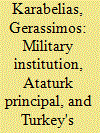

|
|
|
|
|
| Publication |
2009.
|
| Summary/Abstract |
Mustafa Kemal Ataturk principles expressed the desire of the Turkish military-bureaucratic elite to create a strong, modern, western-like state. But, the process of modernization through westernization was supposed to transform the politically meaningless subjects of the Ottoman Empire (the rea'ya) into citizens - a politically meaningful category. Lack of trust over people's preferences and the military's tutelary role under the pretext of the eternal leaders' principles has turned Turkey's quest for democracy into another Sisyphean enterprise.
|
|
|
|
|
|
|
|
|
|
|
|
|
|
|
|
| 8 |
ID:
086711
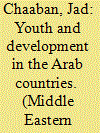

|
|
|
|
|
| Publication |
2009.
|
| Summary/Abstract |
Arab countries are currently faced with the highest youth cohort in their modern history. Arab youth are not only more numerous, but they are also more educated and marrying at a later age than before. One in each three young Arab persons is unemployed, and gender bias against young women's university enrolment and labour participation is pervasive. Against a backdrop of rising frustration among their youth, Arab policymakers need to act quickly. A revision of the social and economic contract towards more and better provision of public goods is central to addressing the challenges faced by the Arab youth.
|
|
|
|
|
|
|
|
|
|
|
|
|
|
|
|
|
|
|
|
|